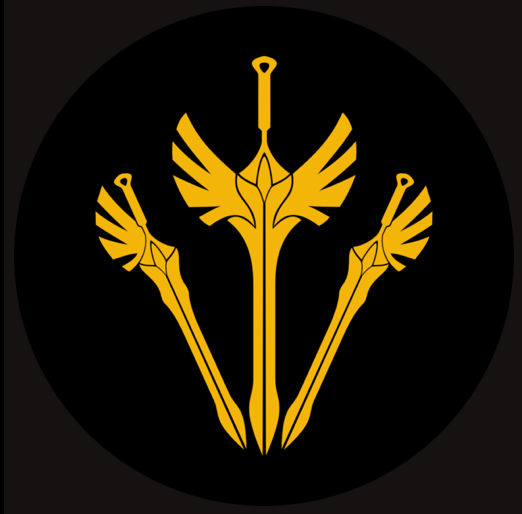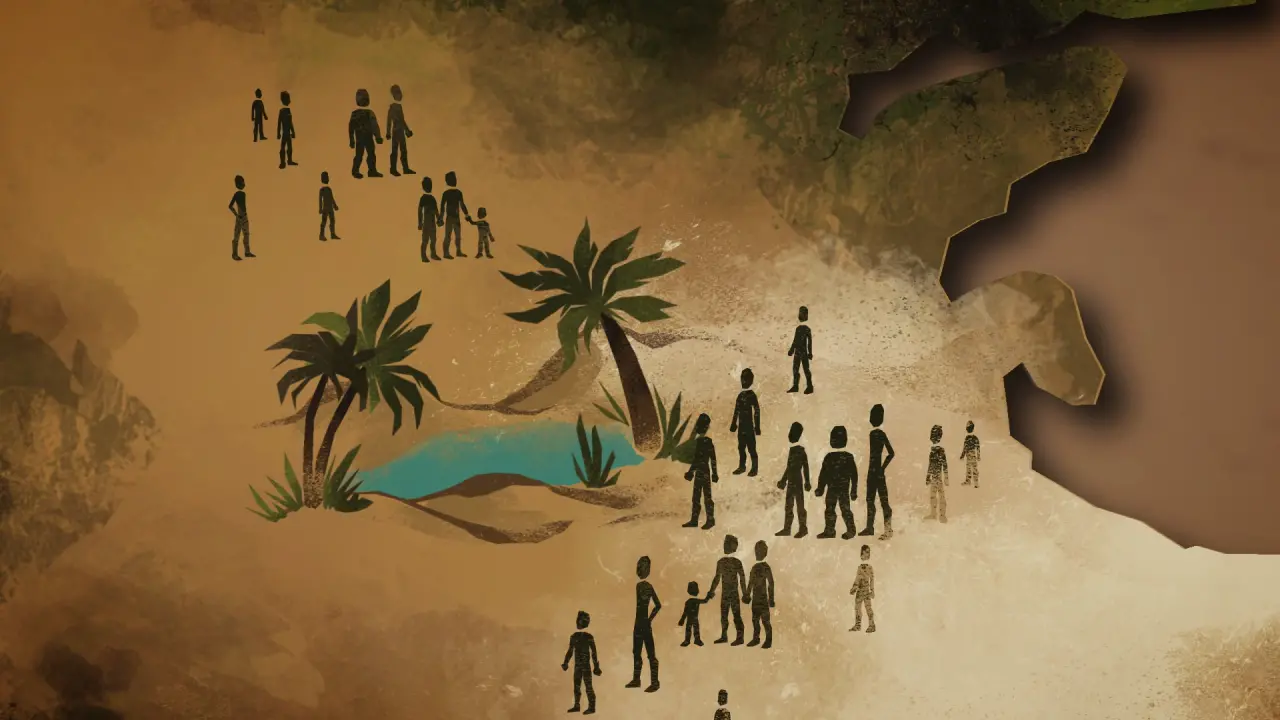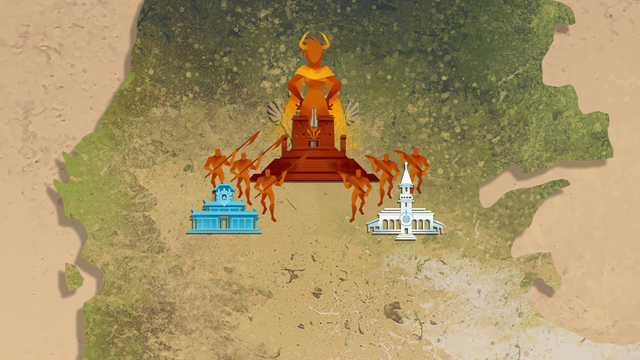The Kingdom of Vacuo
The Kingdom of Vacuo is one of four major states in Remnant. It is also a 'Kingdom' in name only, acting more as a cultural/historical/geographic unit rather than a political one, with the nominal government only controlling a few square blocks in its capital city.
History
Key Dates
-First Oasis Settlement: c. 8500 BGW
-Malik the Sunderer creates the first Kingdom of Vacuo: c. 1000 BGW
-Shakir the Steadfast dies, ending the first Kingdom: c. 850 BGW
-Foreign Garrisons Expelled: September 14th, 5 GW
-Vytal Reforms: January 1st, 1 AGW
Vacuo is the most ancient Kingdom, and simultaneously the least... kingdomlike... of the Kingdoms. The city itself has been inhabited in some way or another for over 8 millennia, but the 'Kingdom' has only ever been a functioning political unit for brief periods of that history.
Vacuo is centered around a massive, once lush Oasis in the center of the Western Desert of Sanus (or 'the Vacuan Desert'). Surrounded on all sides by flat, easily observable terrain, and well endowed with the goods necessary for life, Vacuo was a hotspot for early humans looking for refuge from the Grimm, as they could see any beasts coming from a long way away and could more easily ready a defense. The Vacuan Desert has its own unique threats, such as dangerous wildlife and freak sandstorms,but these too were boons: tracking and hunting these creatures proved a dangerous but reliable way for hearty tribes to secure food in an otherwise barren desert, and the sandstorms would regularly expose veins of dust and ore close to the surface, allowing migrants to easily collect them and bring them back to the Oasis. There are smaller oases scattered across the desert, but 'the Oasis' always refers to central pillar of Vacuan civilization. With defensible borders, fertile land, and a ready water supply, early Vacuo was attactive to settlers, but even migratory desert tribes needed a place to trade and resupply. The Central Oasis was the place of choice for commerce, and it benefitted from all the resources of the surrounding desert. Vacuo was so attractive that it was settled multiple times- waves of migrants, hearing of the lush paradise in the desert, and often fleeing the destruction of the Grimm, made their way to the settlement. This constant population churn is one of the proposed reasons why it was so difficult to maintain a permanent political structure; a more popular one is the fusion/fission nature of the nomadic groups. Vacuan Tribes regularly scatter to collect different resources and gather at central locations to trade with one another. Traveling the desert alone is perilous but if you know the terrain and can get a small group traversing it alone is doable- making it trivially easy for dissatisfied underlings to slip away during the night. Vacuan tribal leadership is inherently unstable and driven by charisma and compromise.
The city is a bit more stable, but it is also reliant upon the tribes for Dust, metal, and access to foreign goods. Any attempt to regulate the tribes risks angering the hardy people who supply your weapons. The disparate factions within the city also prevent unity- mutiple distinct cultural groups, multiple different guilds and merchantile interests large enough to hire their own private security forces, and a rough and tumble population with shared cultural esteem for self reliance, independence and 'shanking whoever the fuck thinks they can tell us what to do' means would be Vacuan rulers tend to be... shortlived.
The exception that proves the rule is Malik the Sunderer. A charismatic nomad himself, Malik spent years breaking the Tribes to his will before steamrolling the city. He and his descendants kept a massive reserve of dust on hands at all times and even they only had nominal control over the outlying groups. Malik gave Vacuo its name with his dynasty, but after 150 years even the most arduous labors could not hold the Kingdom together, and the government collapsed.
Vacuans do have non-violent methods of dispute, although a capacity for violence is crucial for self defense. When two parties come to a disagreement, and realize the costs of fighting outweigh the potential rewards, they have traditonally turned to an Arbiter to settle the dispute. Arbiters are essentially judges, individuals deemed impartial and wise by all parties invovled, and their word is law. Arbiters held no formal power beyond their own sword and reputation, and the title was not formal or permanent, but refusing to obey the edict of an Arbiter you yourself had selected is the quickest way to become a pariah in Vacuan culture. Arbiters were sometimes selected for longer ventures- overseeing an alliance, commanding joint forces, etc, and those who were deemed competent to arbitrate in one case were typically selected by many claimants. Respected Arbiters held immense informal power and influence and were the closest most Vacuans came to a permanent ruler.
Vacuo never expanded beyond the Desert, and its comparative isolation made it vulnerable to foreign armies once they were advanced enough to enter. Neither Mantle, Mistral nor Vale were able to dominate the entire region, but the city itself and many other key Oases fell under foreign control in the centuries before the Great War. Their natural resources were exploited, especially by Mantle, causing environmental damage to the Oasis that has never been recovered from, and Mistral and Mantle carried off many of their people as slaves. However, the foreign Kingdoms also brought considerable populations to Vacuo- establishing permanent colonies that would gradually integrate into the host Kingdom's culture, providing the most recent wave of migrants.
Vacuo was initially nuetral in the Great War, and did nothing as the Valeans were pushed out by the Alliance. However, as the Alliance became more and more demanding the Vacuan people began to sense permament danger- if the Alliance defeated Vale, there was no other power on Earth that could stand against them, and eventually they would control all of Vacuo as well. Swayed by the rhetoric of the Arbiter Hypolita, the largest Vacuan force ever assembled forced the Mistrali and Mantlian garrisons out of the desert and formed a Covenant with Vale for the duration of the war.
Vacuo, for obvious reasons, was never a naval power, and their ragtag army saw very little foreign combat, but depriving the Allies of the dust reserves of the Vacuan Desert, while Vale's navy choked their trade routes, was a mortal blow to the Alliance war effort. In the 10th year of the war, running out of options, Mantle and Mistral launched a massive offensive to secure Vacuo once and for all. The Covenant Army met the Alliance in the Desert and in the final, bloodiest battle of the war, emerged triumphant.
In the aftermath of the war, Vacuo changed the least out of the Kingdoms. The lien was widely adopted as currency, and the advent of the CCTS gradually spread the Valean language to all but its most isolated populations, but the 'Council' established by the Vytal Accords is a ceremonial government that controls a few of the blocks surrounding its headquarters on a good day. Power in Vacuo remains where it always has been- with the Arbiters, the Guilds, the Tribes, those with a swift sword and a silver tongue.
Due to the unstable nature of their culture, Vacuans are generally distrustful and strangers, and especially foreigners, but they are in many ways remarkably egalitarian. Humans and Faunus relations are fairly cordial- Vacuo's Faunus Rights Revolution was a non-event. Women have also had considerable cultural power for a very long time- Malik's Dynasty produced 2 Queens, and 'War Queen' Hypolita was by far the strongest Arbiter in recorded history. People who have been in the harsh land of the desert for months and those whose ancestors have walked it for millennia regularly cooperate for reciprical self interest- the backbone of Vacuan culture. Often described as a lawless society, Vacuans do obey one rule. One, single rule.
"If you can survive here... then you're welcome here."

"Those Who Live By The Sword Die By The Sword"
Founding Date
c. 8500 BGW
Type
Geopolitical, Country
Demonym
Vacuan
127,000 sq. miles/ 328,928 km2
Sphere of Influence
N/A (Politically), Western Sanus (Culturally)
Demographics
Population: ~39,000,000-Density: ~307 per sq. mile/ 119 per. km
-Race: ~80% Human, ~20% Faunus




